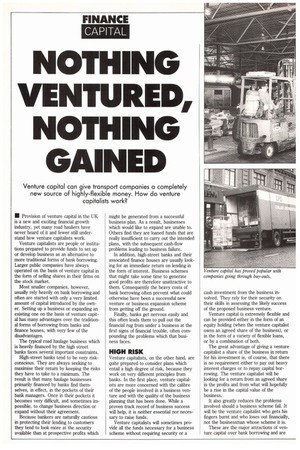NOTHING VENTURED, NOTHING GAINED
Page 56

Page 57

If you've noticed an error in this article please click here to report it so we can fix it.
Venture capital can give transport companies a completely new source of highly-flexible money. How do venture capitalists work?
• Provision of venture capital in the UK is a new and exciting financial growth industry, yet many road hauliers have never heard of it and fewer still understand how venture capitalists work.
Venture capitalists are people or institutions prepared to provide funds to set up or develop business as an alternative to more traditional forms of bank borrowing. Larger public companies have always operated on the basis of venture capital in the form of selling shares in their firms on the stock market.
Most smaller companies, however, usually rely heavily on bank borrowing and often are started with only a very limited amount of capital introduced by the owner. Setting up a business or expanding an existing one on the basis of venture capital has many advantages over the traditional forms of borrowing from banks and finance houses, with very few of the disadvantages.
The typical road haulage business which is heavily financed by the high street banks faces several important constraints.
High-street banks tend to be very riskconscious. They are always seeking to maximise their return by keeping the risks they have to take to a minimum. The result is that many haulage businesses primarily financed by banks find themselves, in effect, in the pockets of their bank managers. Once in their pockets it becomes very difficult, and sometimes impossible, to change business direction or expand without their agreement.
Because bankers are naturally cautious in protecting their lending to customers they tend to look more at the security available than at prospective profits which might be generated from a successful business plan. As a result, businesses which would like to expand are unable to. Others find they are loaned funds that are really insufficient to carry out the intended plans, with the subsequent cash-flow problems leading to business failure.
In addition, high-street banks and their associated finance houses are usually looking for an immediate return on lending in the form of interest. Business schemes that might take some time to generate good profits are therefore unattractive to them. Consequently the heavy costs of bank borrowing often prevent what could otherwise have been a successful new venture or business expansion scheme from getting off the ground.
Finally, banks get nervous easily and this often leads them to pull out the financial rug from under a business at the first signs of financial trouble, often compounding the problems which that business faces.
HIGH RISK
Venture capitalists, on the other hand, are quite prepared to consider plans which entail a high degree of risk, because they work on very different principles from banks. In the first place, venture capitalists are more concerned with the calibre of the people involved in a business venture and with the quality of the business planning that has been done. While a proven track record of business success will help, it is neither essential nor necessary to raise funds.
Venture capitalists will sometimes provide all the funds necessary for a business scheme without requiring security or a cash investment from the business involved. They rely for their security on their skills in assessing the likely success of the proposed business venture.
Venture capital is extremely flexible and can be provided either in the form of an equity holding (when the venture capitalist owns an agreed share of the business), or in the form of a variety of flexible loans, or by a combination of both.
The great advantage of giving a venture capitalist a share of the business in return for his investment is, of course, that there is no requirement either to pay out heavy interest charges or to repay capital borrowing. The venture capitalist will be looking for a return from an agreed share in the profits and from what will hopefully be a rise in the capital value of the business.
It also greatly reduces the problems involved should a business scheme fail. It will be the venture capitalist who gets his fingers burnt and who loses out financially, not the businessman whose scheme it is.
These are the major attractions of venture capital over bank borrowing and are drawing more and more businesses into this form of business finance with the opportunities offered for starting or expanding a business in comparative financial safety.
With the huge capital costs involved in the road haulage industry and the high level of risk involved, this sort of capital is absolutely ideal as an appropriate source of finance for new ventures.
HOMEWORK
However, because this form of finance is so attractive to businesses, venture capitalists are in a position to pick and choose the ventures they will support. Only those people who have really done their homework are likely to get past the first stages of trying to obtain venture capital. Only schemes of very high standards will have any chance of success.
Often too, venture capitalists complain that many of those who put plans to them are far too greedy about the share in the profits they want. After all, they argue, they are putting up all the capital and therefore taking the lion's share of the risk. It is therefore plans that allow for a proper reward for this risk that are likely to be looked upon sympathetically.
Some types of venture capitalists might also want to take an active role in the running of a business in which they have invested on the grounds that their specialist financial skills will benefit the successful implementation of the business plan, and also to ovesee what might be a substantial investment on their part. Others however, take a passive role with no part in the running of the business.
The sources of venture capital used to be extremely limited. The first fullblooded venture capital company in the UK, Charterhouse Industrial Development Company, was established in the 1930s and remained the only real source of venture capital for many years, and is still a leading force in this field.
However, the past few decades really have seen the venture capital ball roll into much higher gear. There are hundreds of sources of this sort of capital. Some specialise in the Government Business Expansion Schemes (BES) in which there are special tax advantages for investors. Others specialise in particular regions or industries.
Venture capitalists place their money in the hands of these specialist venture capital sources, which can spread the risks by investing in a range of business ventures. The amount of investment available can be for sums as small as 220,000 to upwards of £50 million or more. The majority of venture companies, however, are usually looking to make investments between £50,000 and £3 million.
There is therefore no shortage of sources to approach to cover just about any sort of venture for whatever amount of capital is required.
INVESTIGATE BENEFITS
Any smaller entrepreneurial firm seeking to expand or establish a new operation would therefore be well advised to investigate carefully the benefits of raising capital through a venture scheme and comparing this with more traditional borrowing methods. An initial list of sources to approach can be obtained from accountants or from one of the numerous business advice services such as the Department of Trade & Industry's Small Firms Advisory Service.
It is very important to do this basic homework before approaching any venture capital source. There is obviously little point in approaching a venture capital company which specialises in supporting hi-tech operations if you have an exciting plan to buy a new fleet of trucks.
Experience has proved that it is the best-planned and thought out schemes which ultimately succeed in raising venture capital in the first place, as well as being the ones likely to be successful in the long term.
Negotiating with venture capitalists can often prove extremely demanding. In the first instance they will want to see an outline of the proposed business plan. Initially this should give a detailed sketch of the proposals. Extremely detailed initial applications are not appreciated because venture capital companies will be examining large numbers of business plans and do not have the time to look at them all in detail.
Once they have examined the initial idea they will then want to go into the proposed scheme in much more detail. Interviews will be arranged, more detailed financial forecasts prepared by accountants will be requested. The plan can be rejected at any point during this part of the process as points of weakness in the plans will be carefully sought. Remember, the venture capitalist is placing all his faith and his money in little more than the business plan itself and in the people involved.
They are no fools and will go over everything with a fine toothcomb.
Once this stage is passed successfully the fun really begins, and this is where negotiating skills are needed. The venture capitalist will outline the terms they want and the skill is in negotiating just the right balance to satisfy both parties.
The right balance has probably been reached when both parties feel they have not quite got what they wanted. Once these final details have been agreed the final stages of legal contracts are entered into, and it is important to have these documents checked carefully as parties can often misunderstand the final agreed terms of lengthy negotiations much of which will have probably taken place by telephone.
So the process can be an exhausting and time consuming business. Even so, it can all take place very quickly and there are many examples where deals have been completed in as short a time as eight weeks.
The next decade is likely to see an increasingly rapid growth in this form of finance as more and more businesses latch on to its many advantages.
0 by John McQueen








































































































